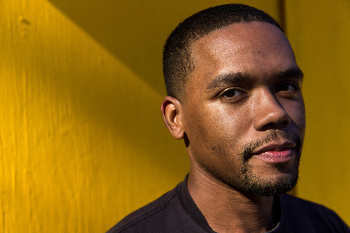Justin Phillip Reed returned to Tusculum to celebrate—at the Old Oak Festival—the launch of his first full-length collection of poems, Indecency, for which he has received high praise:
“Reed’s visceral and teasingly cerebral debut probes black identity, sexuality, and violence and is inseparably personal and political. He displays a searing sense of injustice about dehumanizing systems, and his speakers evoke the quotidian with formidable eloquence.” —Publishers Weekly Starred Review
“Reed wrestles with finding the language to convey the pain of that double oppression and still manages to create terrible beauty.” —Signature
“Reed’s poems are formally inventive, especially when he works in concrete ways on the page. . . . The reader winds up in a new place without realizing they were being moved there.” —The Rumpus
“Within the containment of mostly invented forms, Justin Phillip Reed’s Indecency is the ‘carnal weight’ I’ve longed for in poetry. It’s the guttural dream of utterance that strokes and pokes the body. Reed’s deft craft is so rare, so precise, and driven by language whose surface is texture like teeth, that it seems like freed speech into the ache of repressive histories, white gazes, and uninvited invasions. Violence in Reed’s hands is no longer a thing somewhere out there but is inside the heart, as close as any black desire. Indecency is the new duende. It is like no other book I’ve read; Reed is an extraordinary talent.” —Dawn Lundy Martin
“In this gorgeous first collection, there is no separation of sound from the language it travels in, from the body that produces it, from the experience that evokes it. Justin Phillip Reed achieves an impressive unity of form and content, never obscuring meaning in its varied violences inside the poems’ luxuriant unfolding—the ‘absent-present’ rich with tough phantoms and the fragile living, and underneath: an unwillingness to buckle under unwanted and unasked-for burdens. In conversation with Frank O’Hara and Dawn Lundy Martin, with Michael Brown and Ezell Ford, with Ralph Ellison and Harryette Mullen, with the named and unnamed populace who understand sufferance but also resilience, pain but also sweetness, Indecency is a refusal of pretense, a celebration of possibilities within human complexity—and the hard-earned freedom inextricable from the public and private histories from which it is wrought.” —Khadijah Queen
“Don’t avert: Justin Phillip Reed demands we witness that who’s missing was taken, who fell was dropped, and who died was murdered. Witness, too, that who done it will claim everything but responsibility. That obscenity drives the poet to fracture language into the exquisite shrapnel of lyric paroxysms, leaves a ‘body / . . . deboned of its irony.’ That indecency triggered these devastating poems. Fuck what they claim; here’s what Reed has seen.” —Douglas Kearney
“It would be a mistake, in heeding Reed’s outrage and his sense of urgency (and heed it we should) to hurry past the beauty in these poems, of which there is plenty to be found: potent word play, intricate rhyme, and stray lines like ‘a smeared sweet on his cheek in the parenthesis of a grin’ or ‘the dense streets clapped into a quick-descended stillness.’” —Assignment Magazine

Justin Phillip Reed
photo credit: Nicholas A. C. Nichols
Justin Phillip Reed is an American writer living in St. Louis. His first full-length collection of poems, Indecency, is now available from Coffee House Press. His work appears in African American Review, Best American Essays, Callaloo, The Kenyon Review, Obsidian, and elsewhere. A three-time high school expellee and an ex-college dropout, he received his BA in creative writing at Tusculum College and his MFA in poetry at Washington University in St. Louis, where he served as the Junior Writer-in-Residence. The inaugural St. Paul de Vence James Baldwin Writer-in-Residence, he has received fellowships from the
Cave Canem Foundation, the Conversation Literary Festival, and the
Regional Arts Commission of St. Louis.
Reed was born and raised in South Carolina.
